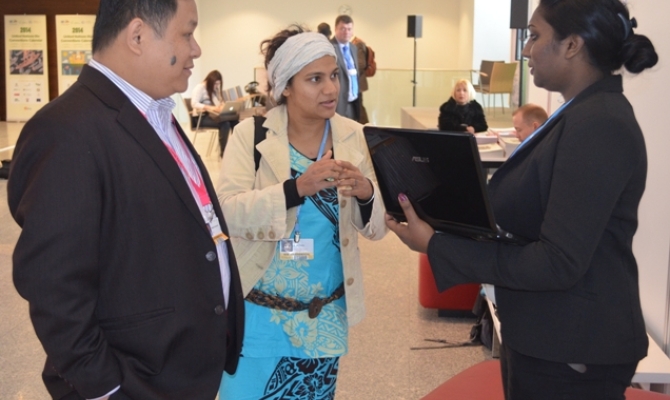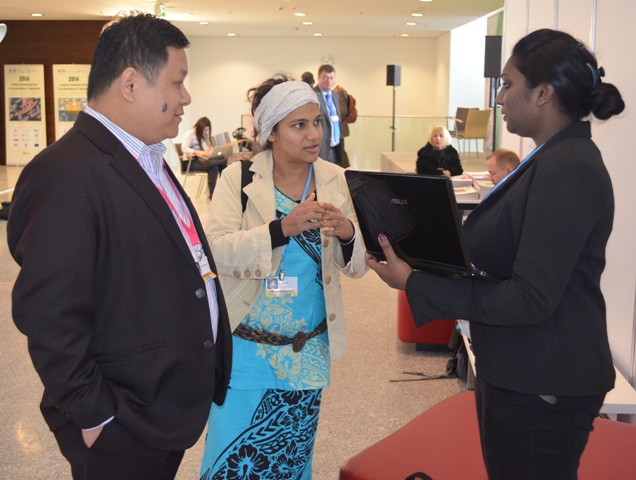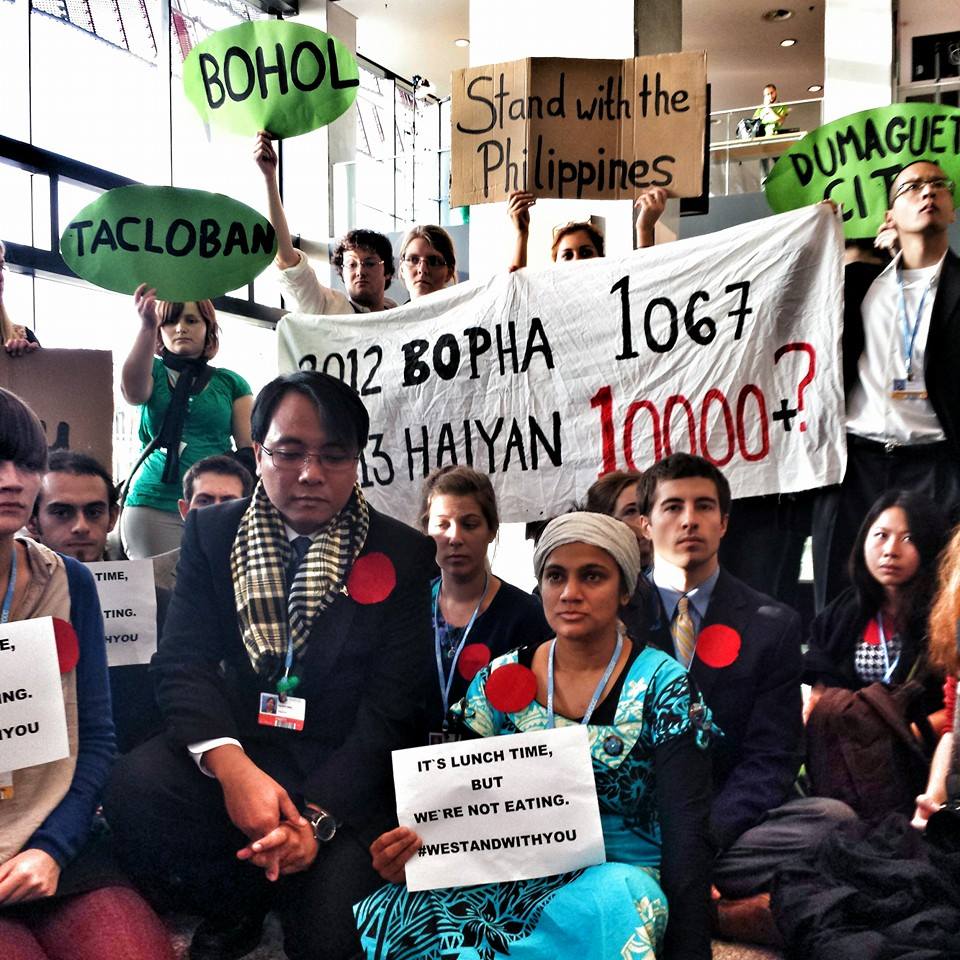
Climate Change Resilience
This is the fourth in a series of human interest stories by SPREP's Nanette Woonton on Pacific women showing leadership in the climate change field.
13 November, UNFCCC, Warsaw Poland - I first met Ashwini about ten years ago in the Cook Islands when she was doing climate change media training and to this day I still think of her as I did then - a bundle of energy in a small package buzzing with passion and enthusiasm.
She is currently the International Communications Coordinator working with the Climate Action Network (CAN) International which consists of over 800 climate NGO's.
She works with the different NGO offices worldwide to help them become better communicators working with countries such as Tanzania, Senegal, Sri Lanka and India.
 Ashwini Prabha in middle, meeting with colleagues
Ashwini Prabha in middle, meeting with colleagues
"What is really interesting for me about this job is that I work with people on the ground. It gives me different pictures of the world, different contexts so I am constantly learning new things," said Prabha.
"When I first started attending international climate change conferences I would see countries speak and I would think - 'speak bolder!' or 'speak to the journalists, tell them your story!"
"It really gives me great satisfaction that now, I am doing exactly what I wanted to do years ago - help people work with the media so they can tell them their stories with confidence. I wish to train more government delegates to do the same."
Over a decade ago Ashwini was studying journalism and environment at the University of the South Pacific wanting to become an environmental reporter with visions of writing for the National Geographic magazine.
Upon graduating her journey took her through working with communities at the Ministry of Agriculture in Fiji, then with the United Nations Development Programme before working on climate change for WWF both in the South Pacific Programme for four years and then for WWF International in Geneva two years.
It was in Switzerland that she meant her husband and they both returned home to Fiji where they started their family. She has a young son - Mana, who turns two in December.
"I learnt that with women your career sometimes gets put on hold when you become a Mother as you have a bigger, more important job of bringing up a human life."
"After giving birth to Mana, I chose to give up a good job I had with UNDP as I wanted to breastfeed as much as possible and raise my baby."
"I think being a Mother is a challenging but honourable job for women and I was fortunate that I put my career on hold and was able to pick it back up again when I was ready as a consultant working from home."
"All young women should be supported to make such choices if they wish."
Ashwini is well equipped with a wide range of skills as a climate change communicator.
She has developed climate change communication strategies, produced climate change campaigns, written media articles, taught media skills training and has helped organisations strengthen their public relations skills.
These are skills that allow for Ashwini to work part time and as a consultant from home when necessary so that she spends time with those important to her - her family.
These combined with her environmental beliefs makes it clear that Ashwini is doing what she loves.
Married to a 'radical environmental humanitarian worker' with beliefs similar to hers, their family has adopted a sustainable lifestyle.
They currently live in a sustainable village in France, are a vegetarian family that grow their own food and do not advocate mass consumption.
Their lifestyle is a compromise between the healthier and more environmentally friendly methods with the parts of a modern living that do not promote wasteful consumerism.

Here at the 19th Conference of the Parties to the UN Convention on Climate Change, Ashwini is also taking part in a 24 hour fast in solidarity to support the Philippines effected by Typhoon Haiyan and the call for real outcomes from these negotiations.
"It shows that actually the talks are not producing much. We want to know how long developed countries will wait to take real actions. Vulnerable countries continue to have stronger environmental disasters while other countries refuse to stop using fossil fuels."
"By joining this fast we are making a stand that people want concrete outcomes and not the usual political lines."
I'm impressed by Ashwini's passion for a cause and more so impressed by how far she has advanced in her career helping others to feel empowered to raise their voice when it comes to climate change. She describes herself as always being 'strange' and outspoken towards different environment causes.
I think she is inspiring - Ashwini, the island girl from Fiji who wanted to be an environmental reporter.
"There is a lot of competition in the professional field and think that we undermine and limit ourselves sometimes. Thinking we haven't studied as much as others, don't come from big enough countries or haven't had enough exposure," said Prabha with parting words of advice for our up and coming female Pacific reporters who are interested in pursuing a climate change career.
"If we are ambitious and courageous we can propel our way into many new things. We women from the Pacific must step up! Don't be shy to take up that space, be ambitious and remain unique, you can do it! Take up those small opportunities because eventually, they will lead to bigger opportunities."
13 November, UNFCCC, Warsaw Poland - I first met Ashwini about ten years ago in the Cook Islands when she was doing climate change media training and to this day I still think of her as I did then - a bundle of energy in a small package buzzing with passion and enthusiasm.
She is currently the International Communications Coordinator working with the Climate Action Network (CAN) International which consists of over 800 climate NGO's.
She works with the different NGO offices worldwide to help them become better communicators working with countries such as Tanzania, Senegal, Sri Lanka and India.
 Ashwini Prabha in middle, meeting with colleagues
Ashwini Prabha in middle, meeting with colleagues"What is really interesting for me about this job is that I work with people on the ground. It gives me different pictures of the world, different contexts so I am constantly learning new things," said Prabha.
"When I first started attending international climate change conferences I would see countries speak and I would think - 'speak bolder!' or 'speak to the journalists, tell them your story!"
"It really gives me great satisfaction that now, I am doing exactly what I wanted to do years ago - help people work with the media so they can tell them their stories with confidence. I wish to train more government delegates to do the same."
Over a decade ago Ashwini was studying journalism and environment at the University of the South Pacific wanting to become an environmental reporter with visions of writing for the National Geographic magazine.
Upon graduating her journey took her through working with communities at the Ministry of Agriculture in Fiji, then with the United Nations Development Programme before working on climate change for WWF both in the South Pacific Programme for four years and then for WWF International in Geneva two years.
It was in Switzerland that she meant her husband and they both returned home to Fiji where they started their family. She has a young son - Mana, who turns two in December.
"I learnt that with women your career sometimes gets put on hold when you become a Mother as you have a bigger, more important job of bringing up a human life."
"After giving birth to Mana, I chose to give up a good job I had with UNDP as I wanted to breastfeed as much as possible and raise my baby."
"I think being a Mother is a challenging but honourable job for women and I was fortunate that I put my career on hold and was able to pick it back up again when I was ready as a consultant working from home."
"All young women should be supported to make such choices if they wish."
Ashwini is well equipped with a wide range of skills as a climate change communicator.
She has developed climate change communication strategies, produced climate change campaigns, written media articles, taught media skills training and has helped organisations strengthen their public relations skills.
These are skills that allow for Ashwini to work part time and as a consultant from home when necessary so that she spends time with those important to her - her family.
These combined with her environmental beliefs makes it clear that Ashwini is doing what she loves.
Married to a 'radical environmental humanitarian worker' with beliefs similar to hers, their family has adopted a sustainable lifestyle.
They currently live in a sustainable village in France, are a vegetarian family that grow their own food and do not advocate mass consumption.
Their lifestyle is a compromise between the healthier and more environmentally friendly methods with the parts of a modern living that do not promote wasteful consumerism.

Here at the 19th Conference of the Parties to the UN Convention on Climate Change, Ashwini is also taking part in a 24 hour fast in solidarity to support the Philippines effected by Typhoon Haiyan and the call for real outcomes from these negotiations.
"It shows that actually the talks are not producing much. We want to know how long developed countries will wait to take real actions. Vulnerable countries continue to have stronger environmental disasters while other countries refuse to stop using fossil fuels."
"By joining this fast we are making a stand that people want concrete outcomes and not the usual political lines."
I'm impressed by Ashwini's passion for a cause and more so impressed by how far she has advanced in her career helping others to feel empowered to raise their voice when it comes to climate change. She describes herself as always being 'strange' and outspoken towards different environment causes.
I think she is inspiring - Ashwini, the island girl from Fiji who wanted to be an environmental reporter.
"There is a lot of competition in the professional field and think that we undermine and limit ourselves sometimes. Thinking we haven't studied as much as others, don't come from big enough countries or haven't had enough exposure," said Prabha with parting words of advice for our up and coming female Pacific reporters who are interested in pursuing a climate change career.
"If we are ambitious and courageous we can propel our way into many new things. We women from the Pacific must step up! Don't be shy to take up that space, be ambitious and remain unique, you can do it! Take up those small opportunities because eventually, they will lead to bigger opportunities."